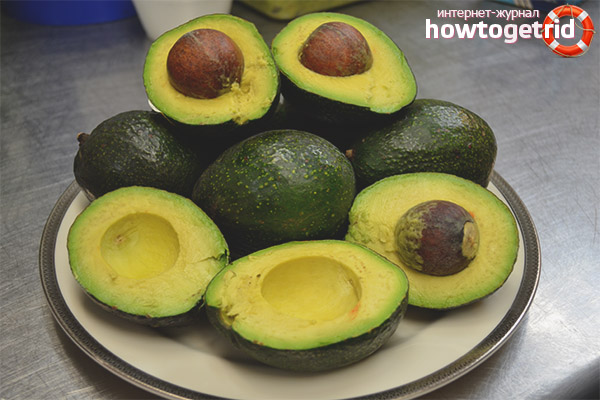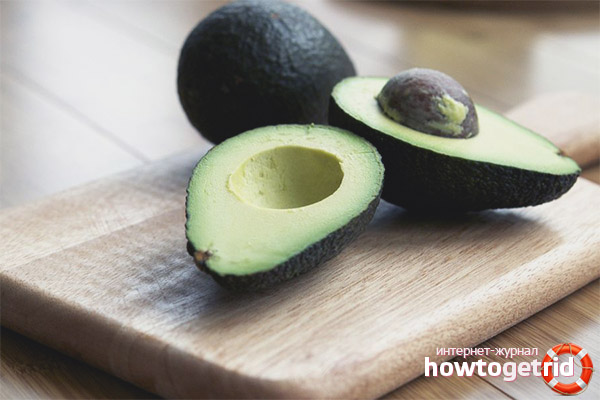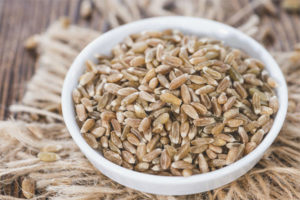The content of the article
Exotic fruit with a gentle and pleasant oily flesh over the past decades has been very fond of our gourmets. There is a lot of information about the benefits of avocados, but is it safe to eat this fruit? Are there any contraindications? What is the daily allowance? If you care about your health and ask such questions, then our article will be relevant for you.
Useful composition of avocados
The American fruit has a unique composition. The so-called "alligator pear" accumulates in its pulp useful unsaturated fats, easily absorbed by the body. Thanks to this, the work of the brain is activated, the metabolism is normalized, the blood composition is cleansed and the skin condition is significantly improved. The avocado pulp contains 25% oil, rich in vitamins and minerals.
The composition of the pulp includes vitamins A, group B, E, PP, which help cleanse and regenerate cells, strengthen immunity, restore metabolic processes, improve nervous activity, blood formation, lower cholesterol and normalize the digestive tract.
Heavy fats are poorly absorbed in the intestine, clogging it with toxins, settle in the vessels, causing the development of atherosclerosis. Light vegetable oils, as in this plant, help restore brain tissue, get rid of cholesterol plaques, cleanse the intestines, nourish cells, and stock up on a charge of high-quality energy.
How much avocado you can eat in a day
The avocado pulp usually contains up to 200 kcal per 100 g, in ripe fruits this mark reaches 265 kcal. This indicator can be compared with the calorie and nutritional value of eggs or dietary meat, which is why vegans and supporters of a healthy lifestyle often resort to healthy calories of avocados.
- The diet should be balanced - do not overeat vegetable fats, eat different food substrates, combine avocados with light fiber fruits and vegetables, bread, meat.
- If you eat the same fruit in excess, the body will be oversaturated with some microcomponents and experience a shortage of others. When there is a satiation with any substances, the body either ceases to absorb them, or produces rejection reactions, an allergy. In order not to waste money and not overstrain the body, do not abuse the fruits of avocados.
- An excess of healthy fats can be reserved by the body. Those who protect the figure, it is better to abandon overeating alligator pear.
Based on your daily calorie intake, calculate the proportion of avocados: it should not exceed 10-15% with a good diet or 20% in a uniform diet.
What to eat avocados with
Given the fat content of the pulp of this fruit, it must be combined with other products. For healthy digestion, the body needs dietary fiber, protein, fats, a certain level of sugar and enough vitamins. Oily vegetable flesh of avocado should be combined with bread, light acidic plants, low-fat protein foods.
Served avocado raw, heat treatment spoils the structure of the pulp and kills most of the beneficial properties of the fruit. In its pure form, the taste of avocados may seem intrusive, so it is complemented by spices, fruit and vegetable aromas, and also diluted with a hint of bread.
Usually, avocados are added to pastas, which are spread on bread, in vegetable soups, mashed potatoes, where avocados replace meat components, in salads and snacks with vegetables and fish. Pay attention to the guacamole pasta with citruses and spices, served with crackers or a shrimp salad with citrus and avocado.
Typically, a delicate pulp with a nutty flavor goes well with:
- fruit acid (grapefruit, lime);
- spicy pungency (jalapenos, garlic);
- light cereals (corn, rye bran bread);
- spices (cashews, ginger, basil, oregano);
- white diet meat (seafood, oysters).
Who is contraindicated with avocado?
People with obesity or metabolic disorders, small children, individuals with individual intolerance to this plant should refrain from eating an oily fetus.
In general, avocado fruits are safe, have a low glycemic index, almost do not contain acids or bitterness, which could irritate the gastrointestinal mucosa, and rarely cause allergies. Therefore, avocados are well absorbed, and its moderate consumption only benefits the body.
When it is recommended to use avocados
This nutritious product is especially beneficial for the body in some cases, for example:
- when recovering from illnesses;
- with constipation, hemorrhoids;
- at elevated pressure;
- with diseases of the joints;
- with skin diseases;
- for the treatment of anorexia;
- during pregnancy.
To replenish the balance of fats in the hot summer season, you can replace the heavy meat and dairy components with this herbal product.
In cold weather, when the body needs more calories, part of the vitamin-mineral complex can be obtained with avocados, replacing them with lighter fruits and vegetables that do not saturate the body.
Warnings
For avocados to benefit your body, choose ripe but not spoiled fruits. Try to avoid soft, sodden fruits, prone to rotting, as well as immature fruits - such fruits can cause indigestion due to an excess of pectin components.
Do not buy products without labeling, so as not to encounter unsuitable fruits.
Experiment with pleasure - and the avocado will become a favorite on your table.
Video: How much avocado can I eat?












Submit